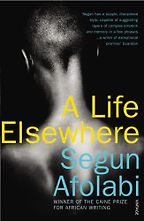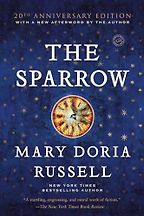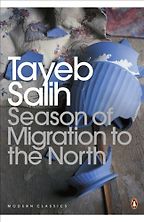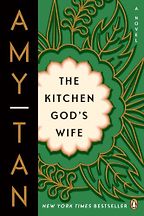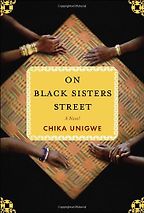This first book by Segun Afolabi is a collection of short stories?
Yes. Segun is someone I published at Cape. He is Nigerian but his parents were diplomats so he has travelled a lot and his stories reflect that. One of them, Monday Morning, won the Caine prize. It’s about a little boy living in a refugee hostel and he sees this amazing hotel one day and goes in and falls asleep on one of the beds. The writing is very still and there is not much plot really, but the stories are about how people live when they are seeking a life elsewhere. Jumbo and Jacinta is about a couple who have moved to Canada, near Niagara, and the quiet wife suddenly realises that she has never liked her husband. There is another one about a man who goes to a dominatrix and it gets very pervy and sexually disturbing. What I love about Segun is that he doesn’t do the thing that people do when they are writing about black people, like talking about coffee-coloured skin or deep chocolate eyes or anything. He just writes them as people and I love him for that. As a black reader who reads a lot I always find there is a big pointer to this person being black. Segun writes them as people, not ‘other’ people.
As someone from both Zimbabwe and America, do you find that you are interested in books on the Diaspora because you are a part of it?
Books are often like men in that you can be surprised by the ones you find cute. I had lunch with a scout recently and she was asking me about the books I publish and looked at my list. She said that I obviously had an interest in identity, in people moving from place to place. I said; ‘Really?!’ So, I went and looked back at my list and I think they are often about lives lived elsewhere.
Does the sparsity of Segun’s style say something about a sense of loss?
There is a sense of loss in the stories, yes. Sometimes people move from a bad situation to a better one though, and the characters are never sure what it is that they’ve lost. In some cases it’s obvious, like the couple whose child has died, but when you move to a new place and have to become a new self you have to ask yourself who that old self was, something you wouldn’t have to do if you stayed in the same village where your grandparents grew up. You have to ask questions and that is what I like. I like the questioning.
Tell me about the Maria Doria Russell book.
I am a big science fiction junkie. Ekow Eshun wrote a sci-fi book called Black Gold of the Sun and he says that a lot of immigrant children love science fiction because it is about travel to new worlds even further away than the world they have come from. I found that made sense to me. Russell is a feminist academic and this book is about a Jesuit priest on a Catholic mission, not to Peru, but to outer space, to a place with which contact has been made. There is some communication and trade and he is now going on this mission. He develops a deep relationship but there is a fundamental misunderstanding that results in terrible tragedy. He has committed a terrible murder of a child and can’t forgive himself. A Jesuit in space! It’s brilliant, but it’s not at all comic. It is about how you can transfer God and Jesus to space, how people might seem to have understood you when they have not understood you at all. There is astonishing writing here and if it wasn’t science fiction it would be read as great literature.
Is it about how big God is, or how small?
I think it is about cultural exchange. About the idea of God stemming from cultural experience and what happens to religion on another planet, how it changes as our experience changes and whether or not it can take changes and whatever we find there into account. It is really about one man’s crisis of faith. I mention the mission to Peru because there are similarities – taking this ancient message somewhere where it is not nearly as ancient as what is already there.
Five Books interviews are expensive to produce. If you're enjoying this interview, please support us by donating a small amount.
Tell me about Season of Migration to the North.
I published this at Penguin and it’s translated from Arabic so it’s very beautiful language. I love the title. It’s about a Sudanese man who has lived in England and been educated at Oxford and he goes back to his village and meets a stranger there, Mustafa, who has also been to England. The narrator is not named. It’s about return and what happens when you make that journey. Really, once you’ve left you can never come back, even if you do go back.
Is the stranger a part of himself or something?
In a way, he is. He has also been to England but he has a shadow, he is harbouring a secret. I don’t want to be silly about it, but the narrator’s a bit miffed that this man’s there. You come feeling unique, but you’re not. He had wanted to come back and civilise everyone but they don’t need civilising.
Have you had that experience of not being able to go back?
Well, I lived in Zimbabwe until I was five, and then in America until I was 19 and then back to Zimbabwe again – I am stuck at certain ages with certain people. With my grandmother I’m a five year old and in the village it’s hard to behave like an adult. With my parents I’m stuck at 19 and I’m out of my depth in Shona if the conversation is about politics or something. I keep having to tell myself I’m a 42 year old mother of two!
Tell me about the Amy Tan.
This is my bestseller! Amy Tan unleashed this western obsession, or interest in, Chinese women’s writing and it’s not the best book in the world, but it’s a classic story of not understanding your parents until it’s nearly too late. There is this woman married to a white American man and she has always thought her parents never loved her. She finds out that in Chinese culture you must never tell your children they are beautiful or praise them because the spirits might be listening and will come and take the child away. So they are always saying you could be better, you could do better because you never know what spirits are listening. In some ways it takes you to a completely alien world and in other ways it’s completely familiar because we all have mothers. The food in it is amazing too.
Get the weekly Five Books newsletter
And your last book.
The Chika Unigwe?
I published this at Cape. She is Nigerian, a professor and a city councillor and she is married to a Belgian. This is her first book in English – she writes in Flemish. It opens in a house on this street and one of the women has been murdered and they are just finding this out. As they mourn her the other women all tell their stories. They are all prostitutes but not escort girls. They are the ones who flash their boobs at me in the windows – not the high end. The stories alternate and as they tell their stories you find out what happened to the murdered woman. One of them is a Sudanese refugee pretending to be Nigerian. She was 15 when her parents were killed and she was gang raped. Then she has an affair with a UN soldier in a refugee camp but his parents wouldn’t accept her and he offers to get her to Belgium where she knows she is going to be a prostitute. She decides to go. Another is the daughter of a religious father who has abused her. They are all trafficked by the same man and one of them is grateful to him for getting her out. I had always wondered who these women were and when I saw this book, I thought; she’s going to tell me. In some ways it’s about the different ways women are hurt, and that’s universal but, a bit like Alice Sebold in Lovely Bones, she talks about deeply troublesome and sexually violent events but she treads so lightly that sometimes the shock of it really hits you in a way that it wouldn’t if she’d been more graphic. They have all made choices and sometimes you feel they made the right choice. One review recently said the men aren’t fairly treated in the book but, actually, a lot of men are shits and I don’t think there’s a problem with showing that. There is some beautiful Nigerian pidgin English in this too. She did a lot of research and spent a lot of time with these women. We often judge them but if you’re father’s dying and you can’t afford medicine but have the option to have sex with these men abroad…
Five Books aims to keep its book recommendations and interviews up to date. If you are the interviewee and would like to update your choice of books (or even just what you say about them) please email us at editor@fivebooks.com
